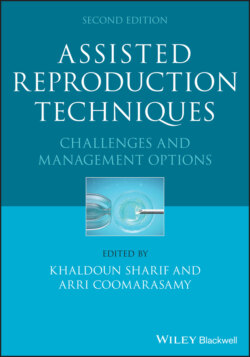Читать книгу Assisted Reproduction Techniques - Группа авторов - Страница 45
Hepatitis C
ОглавлениеPrevious HCV infection is not known to directly affect fertility [14]. Therefore, natural pregnancy may occur in HCV positive couples. When pregnancy is naturally conceived, HCV increases the risk of preterm birth, which is thought to be due to the effects of HCV on trophoblasts [15]. The risk of vertical transmission in pregnancy is estimated to be approximately <1% when there is positivity for HCV‐antibody but negative results for HCV RNA testing. If both HCV‐antibody and HCV RNA tests are positive, the vertical transmission rate is estimated at 11%. HIV co‐infection increases the risk of transmission further to 15% [16]. Pregnancy does not appear to impact the course of chronic liver disease secondary to HCV infection. Importantly, there is no immunoprophylaxis available for neonates born to HCV positive women; instead HCV status can be checked at 3 months of age using an HCV RNA PCR test or serum HCV antibody testing after 18 months of age.
Antiviral therapy for HCV infections can lead to cure of infection in 90% of HCV carriers. It is therefore important that known HCV carriers are reviewed by a hepatologist before commencing fertility treatment. Hepatic function can be ascertained, and the risks of vertical transmission can be reduced with HCV antiviral therapy.
In male HCV carriers, HCV RNA has been detected in sperm, but the risk of sexual transmission is very low. Similarly, the risk of transmission of HCV from spermatozoa to fetus has not been proven. There is some evidence to suggest that male HCV carriers have worse sperm results, fertilization rates and pregnancy outcomes when compared with males without HCV infection [17]. However, other studies have shown conflicting evidence with similar pregnancy rates achieved in couples with male HCV carriers compared to couples unaffected with HCV.
In female HCV carriers having ART treatment, it has been suggested that the response to gonadotropin stimulation is reduced. This effect is thought to be due to altered granulosa cell function in ovarian follicles recruited during stimulation [18]. Studies have also suggested that HCV positive women have reduced fertilization, implantation and clinical pregnancy rates when compared with unaffected women. However, the evidence is conflicting, and HCV infection is not thought to cause adverse pregnancy outcomes in those undergoing ART [18]
Overall, ART is considered to be safe in HCV‐positive couples (Case History 2). Treatment should be started after liaison with a hepatologist and consideration for HCV antiviral therapy. If antiviral therapy is not effective, ART should be commenced when HCV viral load is low. The HCV viral load can then be monitored during pregnancy.
